Third Bridge Group Review – What It’s Really Like Consulting for a World-Class Expert Network
Receive an invitation to consult with Third Bridge? Wondering if it’s legitimate, what to expect and how much you can earn? Our comprehensive Third Bridge review will show you everything you know to regularly land high-paying consulting projects with this major expert network.
What is Third Bridge Group Limited?

In the world of expert networks, few organizations have stood out as boldly as Third Bridge. Founded in 2007 as Cognolink before a 2015 rebrand, Third Bridge Group’s aim is to provide invaluable business insights, data, and in-depth research services to private equity firms, hedge funds, and strategy consultants.
During its relatively brief existence, this company has rapidly transformed itself into a global entity with a team of 1,000+ employees in eight offices spanning three continents. Headquartered in London, Third Bridge maintains offices in New York, Los Angeles, Shanghai, Beijing, Hong Kong, and Mumbai, catering to the information needs of over 1,000 investment firm clients. Third Bridge is considered to be on of the ‘big five’ expert networks that dominate the industry, alongside GLG, Alphasights, Guidepoint, and Coleman Research.
On a mission to “democratize the world’s human insights and upend the traditional research model,” Third Bridge links business leaders, investors, and experts able to share critical insights and perspectives to inform critical decision-making. The company utilizes contracted specialists to provide these invaluable insights.
A notable recent milestone is an acquisition of a minority stake in the firm by private equity group Astorg. Though Third Bridge’s three co-founders—Emmanuel Tahar, Joshua Maxey, and Rodolphe De Hemptinne—will remain majority owners, the expansion is a significant milestone in this burgeoning company’s race to the top.
Though it has its hands in a few cookie jars, including various asset classes, sectors, and regions, most of Third Bridge’s clients are professional financial services firms. According to their site, they conduct over 10,000 interviews each year, covering 4,000 global private and public companies. Meanwhile, clients can access 15,000+ previous interview transcripts. As Third Bridge continues to grow, they need more and more specialists able to tackle the workload. That’s where you come in!
Overview of Expert Networks
Despite being a ~$2 billion-a-year industry, expert networks are still relatively unknown to the general public. However, the business world is quite familiar with expert networks like Third Bridge and uses them all the time. How is it possible that such a burgeoning industry flies under the radar? Simple—businesses want discretion when seeking expert consultations. No company wants to advertise the fact that they’re looking for outside help or opinions. Meanwhile, those expert networks really don’t need to promote themselves to anyone outside their potential client base.
Indeed, the only reason expert networks are gaining more exposure is that they’re expanding and bringing on additional consultants. Before the Internet, expert groups recruited talent the old-fashioned way, by making calls and sending letters. Now they connect with talent across the globe through ads or messages via LinkedIn.
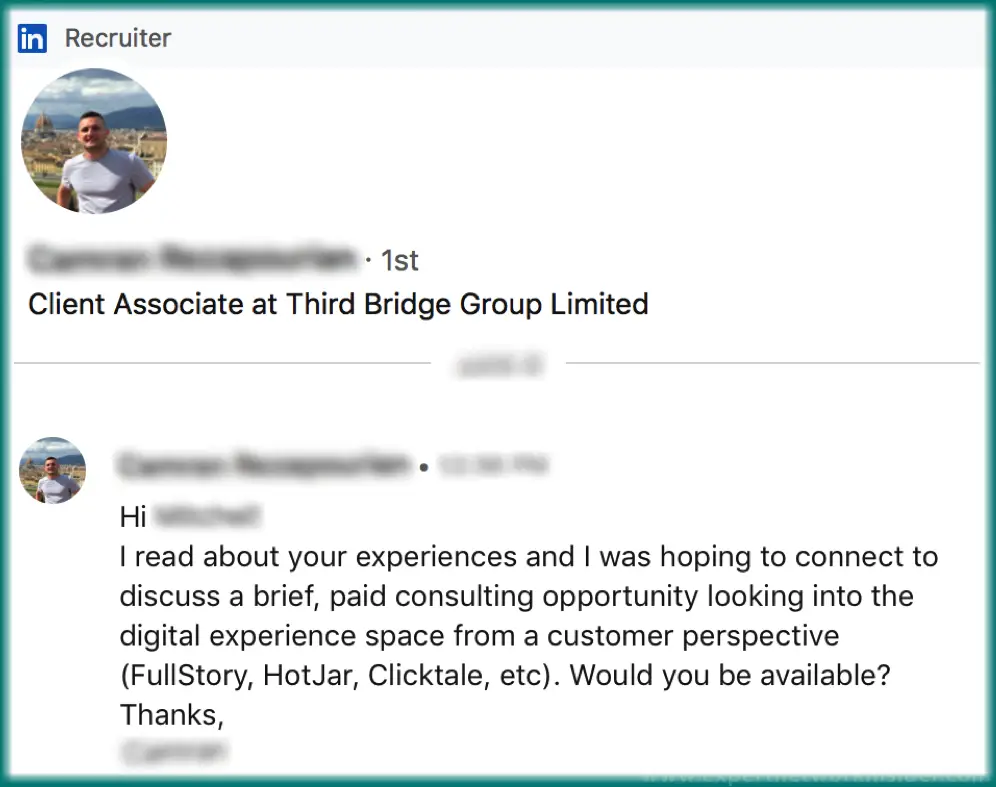
So what precisely do they do and who are they hiring? Expert networks solve information problems for businesses. They find areas where companies need insights, and then they hunt for suitable subject matter experts to supply those insights. That’s all there is to it. Expert networks are middlemen, saving businesses time by doing the legwork to find and vet advisors.
When a client reaches out with a project, Third Bridge (and other networks) dive into their pool to find prospective advisors. The client selects the one they want to work with after asking questions and reviewing candidate proposals.
How does Third Bridge make money from this transaction? The same way any middleman does; they charge a fee. In the case of expert networks, fees can be significant! Basically, an advisor sets their hourly consulting rate, then the expert network marks that rate up and keeps the difference.
Large companies, startups, investors, and corporate consultants don’t mind paying the markup in exchange for valuable strategic intel. Though it is not always possible to quantify the return on investment for such counsel, it’s worth the money if they learn something that earns or saves them more than the consultation cost.
What should you expect on a Third Bridge consulting call?
Speaking of costs, how much do Third Bridge specialists earn an hour, and what do they have to reveal on those calls? We’ll get into rates in a little while, but let’s talk about what’s covered in an expert network project call first.
Calls can be broadly categorized into one of three styles:
Industry overview — Investors reach out to specialists to collect information they’ll use to paint a “big picture” that forecasts activity and informs decisions on investments or other strategic actions.
Company deep dive — Deep dives are analytical, investigative explorations of target companies or a particular area within a company. Investors glean info on a company’s growth potential or problems and respective consequences.
Consulting with consultants — Large companies have their own consultants (or contracted agencies), but it never hurts to reach out for additional objective insights.
Third Bridge posts interviews with some of their specialists, such as Neil Farmer, founder of Farmer Associates. Neil describes his packaging and materials sector as a “minefield to understand,” saying he can “take people through what I know and share it with them so hopefully they can make good decisions, invest in companies, and grow the industry.”
It’s important to understand that expert networks exist to give companies an edge without breaking ethical guidelines or crossing legal boundaries. Advisors aren’t allowed to disclose confidential or protected information. They must maintain strict standards during phone discussions. Failure to abide by Third Bridge’s terms, or the terms set forth by the client, could result in dismissal from a project at a minimum. As noted on their webpage, their “strict compliance framework is designed to protect our specialists and avoid the disclosure of confidential information, material nonpublic information, investment advice, and defamatory statements.”
Dig into our free, comprehensive Ultimate Expert Network Guide to learn more secrets about high-paying consulting calls!
Do I qualify as a subject matter expert?
Alas, the question everybody asks—do I qualify? We can’t answer that since we don’t know you. But let’s talk about what it takes to qualify as a “subject matter expert” in the first place. Have you ever worked for a specific industry or a specific company for an extended period? If so, did you not acquire hard-won knowledge that might potentially be useful for others to hear?
If the answer is yes, chances are you qualify to work on projects related to your field or prior employers. The truth is, you don’t have to determine whether you’re qualified or not. Let Third Bridge do that for you. And if you’re concerned you’d be an “imposter,” we suggest you let somebody else worry about that, too! Apply and let them figure out if they could use you or not.
How do I set my Third Bridge consulting rate?
This is another popular question we see a lot. If you’ve ever gotten a LinkedIn message or seen an ad from an expert network, you probably noticed part of their “hook” is to dangle promises of fat checks in front of you. An ad might read “Earn hundreds of dollars an hour!” but is that really possible?
Yes, it is! Some consultants do earn hundreds of dollars an hour.
Third Bridge and their peers want highly paid pros in their network. Why? Because the more your hourly rate is, the more they’re going to mark it up. That’s right; they aren’t looking to onboard people who undervalue their potential. On the contrary, they’re seeking advisors who demand a lot for their valuable time, experts able to talk the talk and walk the walk. If you can deliver the goods, set your rate accordingly.
Alright, let’s get specific. If you worked in a specialized role or held a position of high authority, expect to charge more. Seasoned professionals and mid-level executives make $300 – $500 an hour in some cases.
If you were more generalized or lower on the totem pole, that’s okay; just understand your insights may carry less monetary value to the clients. Thus, you might set a rate between $100 – $150/hour with Third Bridge.
What about you C-suite types out there? You know who you are, and if you see dollar signs floating over your eyes right now, that’s because you’ve realized you could monetize your knowledge for up to thousands of dollars—per hour!
Third Bridge “identifies and interprets the context, narrative, causality, connection, and meaning in data or events.” Their clients are looking for “the signal in the noise,” meaning they need high-end, value-rich insights and are willing to pay top dollar for them. The ROI is worth it if a piece of advice results in a million-dollar decision tilting in the right direction.
Check out our detailed brief on how to price your consulting services to learn more.
What are the downsides to consulting for Third Bridge?
If there’s such a thing as a downside to earning hundreds of dollars for an hour-long phone, then please let us know!
But seriously, the biggest downside seems to be that work isn’t consistent. Most projects Third Bridge receives from clients only require a short consultation. Even though they have many, many clients, you won’t be selected for every relevant project (and even if you did, clients won’t always select you based on your proposal).
So, a typical complaint on Glassdoor goes something like this:
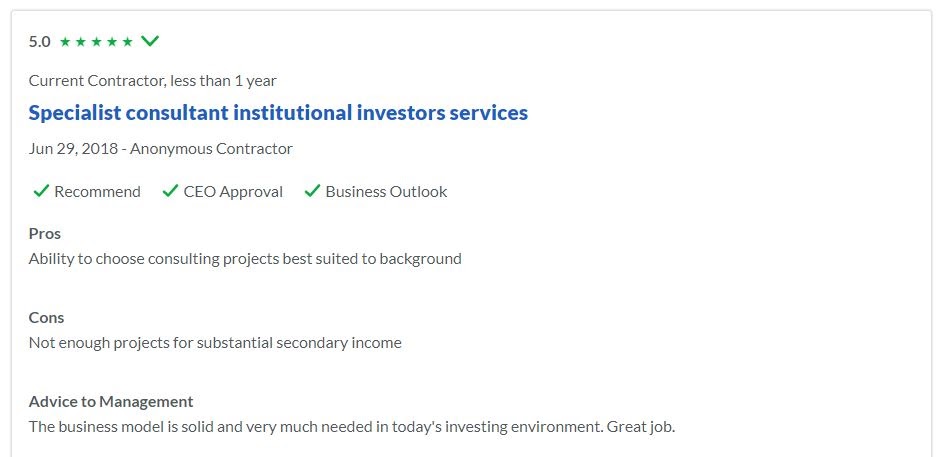
Third Bridge consulting projects are often sporadic, last just one hour and are thus pretty much the opposite of a full-time gig, and there are zero guarantees of work. Some consultants are getting steady projects; some might only get picked up occasionally. Either way, in all fairness, that isn’t Third Bridge’s fault. Their job is merely to provide an arena where clients and consultants can connect. Whether that connection happens depends a lot on your actions.
For example, knowing that other advisors are vying for the same projects should motivate all applicants to put their best foot forward during the proposal process. If you whisk through a proposal and don’t demonstrate your potential value to the client, that client is apt to pass you over and hire the person who spent a good 5 or 10 minutes answering screening questions cogently.
Again, there’s no promise you’ll get selected even if you do spend ample time on the proposals, and that can be frustrating. All you can do is keep trying…or give up. The people who are successful keep trying and get better over time.
The biggest complaints seem to stem from either miscommunication or misunderstood expectations. Like other expert networks, Third Bridge prorates billing. You might set an “hourly” rate but they pay per minute, so if your call is only 50 minutes, they don’t pay for 60.
While that seems fair to us, not all Third Bridge consultants share the sentiment:
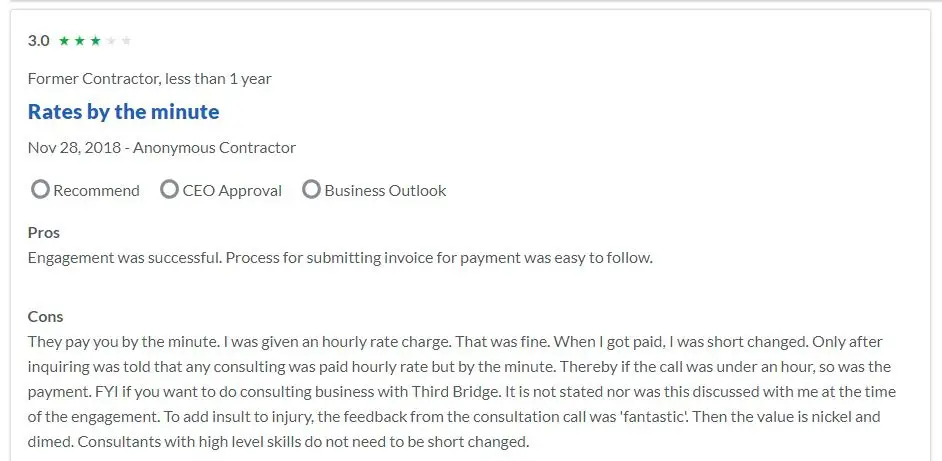
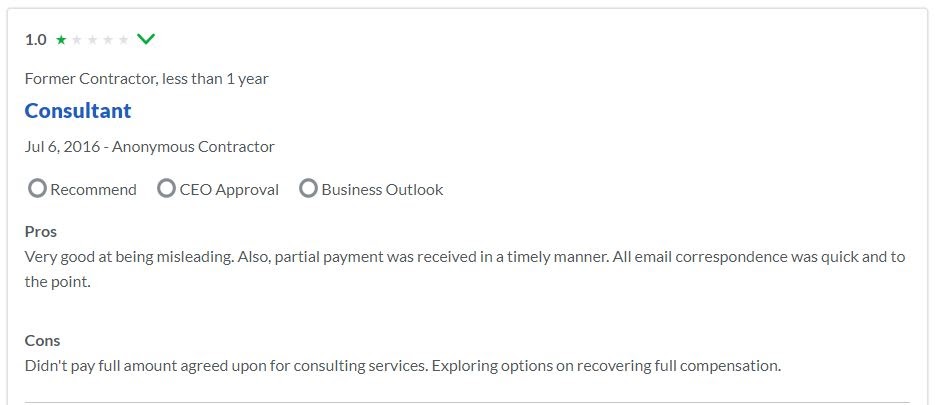
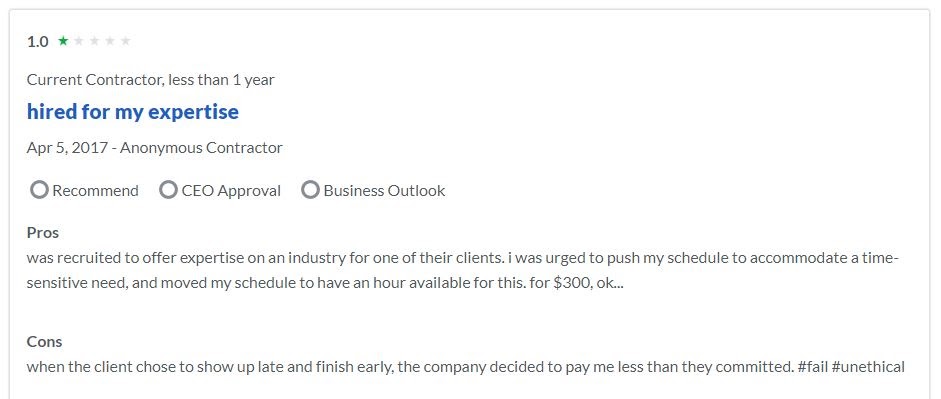
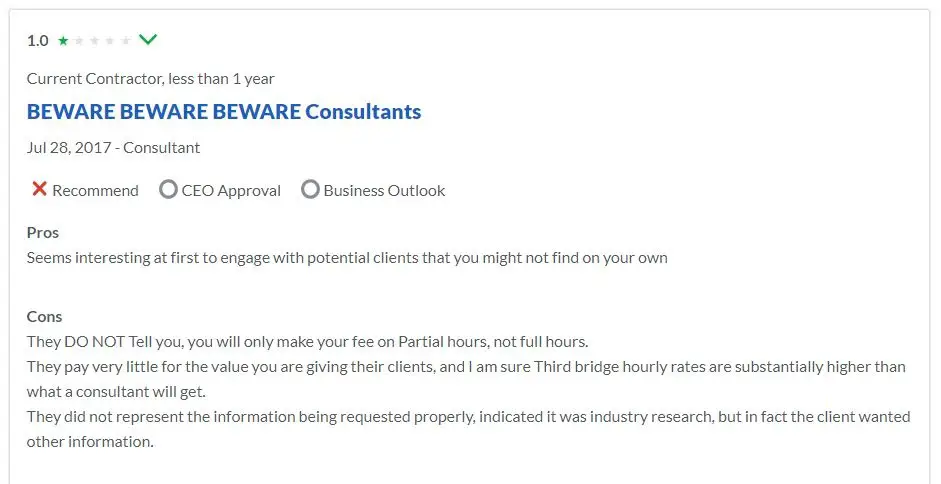
With a bit of clarity and expectation management upfront in regards to billing, specialists can come away feeling like they were paid correctly.
How can I win more Third Bridge consulting projects?
The trick to winning projects is to a) be qualified and b) be persuasive and persistent. If either of those is missing, you’ll find yourself on the “famine” side of their “feast or famine” environment.
What does it mean to be qualified? In their tagline, Third Bridge is about “Human insights. Better investment decisions.” Think of that as a filter. Will your insights lead to better investment decisions for clients or not? Keep in mind, “better” refers to how good their decisions would be without your input. They don’t just want good advice; they want better than average, expert-level advice. They want to hear something they couldn’t find off Google.
How do you convince them you can provide that? Again, you have to be qualified and persuasive! It doesn’t do any good to be qualified if you can’t convey that to them in your proposal. And it won’t help anyone if you apply to a gig you actually can’t help with. In fact, that’ll lead to disappointment during the call and a bad review for you. Long story short—follow the formula of being qualified and persuasive, and don’t forget the persistence part!
Take time to review openings carefully, apply for all the ones you qualify for, then write strong, compelling proposals. Let them know you’re the advisor they’re looking for! Optimize your proposals (and your profile, too) with relevant keywords and data points. Put in solid work up front, and it’ll pay dividends over the long run as you pick up more gigs, establish your reputation, and build momentum!
On each call, give it your all. Add value for that customer, and they’ll leave a nice review that others will see, plus it’ll let Third Bridge’s agents know that you’re a hot commodity worth recommending to more clients.
What types of consulting projects does Third Bridge take on?
Third Bridge offers direct dialogue opportunities via knowledge-sharing phone consults and Forum Interviews. This process begins with a client proposing a project to Third Bridge, which conducts initial research to find and connect suitable specialists. Once the specialist is vetted and agrees to work, the consult or interview is set up.
Phone Consultations
Third Bridge connects specialists to credit investors, public and private equity investors, and other professional businesses via calls that may last an hour or more. Their compliance program features three pillars focused on ensuring confidentiality and adherence to their Code of Ethics. Specialists receive sufficient education and training to know what they can discuss or not. For example, it isn’t allowed to talk about current employers nor any employer they worked for within the past six months.
Clients usually drive the interview or conversation, but specialists are ultimately responsible for ensuring they don’t breach any agreed-upon rules. Additional restrictions may be placed on advisors who have special access to unpublished work, hold an elected office, or work for the government.
Forums
Forums are an area where Third Bridge pulls specialists from their talent pool to team up. These teams are devised to offer broader insights “across different stages of the investment process, from idea generation to evaluation, due diligence, channel monitoring, or portfolio work.” Specialists on these forums find and interpret contexts, causes, and connections, extrapolating the deeper meaning behind the deluge of data.
Is Third Bridge a scam, or are they legit?
Third Bridge is a legitimate and reputable global business, profiled on Bloomberg as a business that “offers human insights and unfiltered market intelligence to private equity firms, hedge funds, and consultants.” Their board and team member profiles are available to view on Crunchbase, along with financial data and other pertinent information. You can easily find proof of Third Bridge’s legitimacy in the news, such as their senior analyst Sebastian Skeet’s recent comments in Yahoo! Finance on the pharmaceutical company AstraZeneca.
How much should I charge, and how much can I earn at Third Bridge?
What you charge depends on how much you believe your insights can add value to Third Bridge’s investor clients. If you know something that might save them a million dollars, then that knowledge carries serious value! If you know more generalized information that could help steer them towards better decisions, but won’t necessarily save or make them a fortune in the near term, then set your rate accordingly.
Expert networks typically don’t dictate what you choose to charge, nor do they disclose how much their consultants earn. Third Bridge is no exception. They just add their markup onto what expert network rate you decide to charge. If you don’t pick up many gigs at that rate, you can always adjust later. If you are getting swamped with invites, you might be undercharging and should give yourself a raise!
Conclusion
Third Bridge is a well-respected leader in the expert network industry, with numerous workplace awards. While browsing through Indeed or Glassdoor you’re sure to find complaints, most of those come from full-time employees (usually college grads in their first job) who didn’t like their boss or their hours.
Contracted specialists work from home, and will probably never have to deal with management or face long work hours. You only take the gigs you want and once you hang up the phone, your work is done. These types of consult jobs can not only potentially earn you a nice side income, but, as Third Bridge puts it, you’ll “gain additional perspectives from the world’s leading investors and decision makers.”
If that sounds like an offer you don’t want to miss, then check out Third Bridge’s specialist contact page to apply today!

